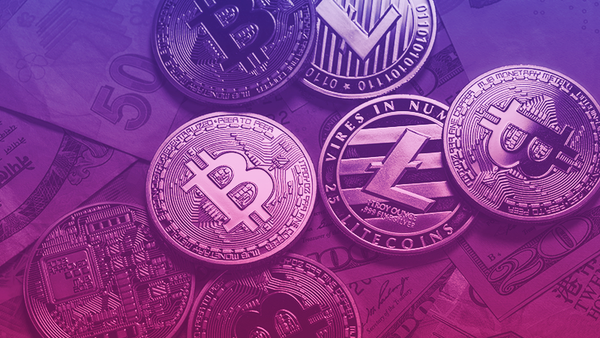
As you probably heard, the SEC has approved the creation of Bitcoin exchange-traded funds (ETFs). Until now, Bitcoin purchasers either needed to create "wallets" on a cryptocurrency exchange or buy shares of a fund called Grayscale Bitcoin Trust (GBTC).
The latter's structure was unattractive. Whereas ETFs' prices reliably match those of their underlying assets, Grayscale's often did not. (That no longer holds: Once the SEC lifted its ban, Grayscale promptly converted its fund into an ETF.)
As the Grayscale fund also carried a much higher expense ratio than the ETF newcomers, Bitcoin owners have become doubly fortunate. They can now hold their cryptocurrency in cheap, well-regulated funds, without worrying whether their crypto exchange will be the next to be seized or whether they have lost their wallet’s password. Operationally, there has never been a better time to hold Bitcoin.
Vanguard's Dissent
Not, however, for Vanguard customers.
Not only has the company forsworn creating a Bitcoin ETF, but it refuses to carry anybody else's Bitcoin funds on its brokerage platform. Those wishing to purchase cryptocurrencies must go elsewhere.
Naturally, this decision angered Bitcoin enthusiasts, but it delighted me. That reaction is not personal. I would not buy cryptocurrencies myself, as they are speculations rather than investments (if an asset cannot generate cash, under any circumstance, then there's no reason to hold it except for the hope to sell to a higher bidder), but I do not begrudge others doing so.
Read More: Is Bitcoin Ungovernable?
The Right Side of History
My conviction instead is, as Michael Corleone would say, strictly business. Throughout its history, Vanguard has often refused to go where others had trod:
1) Government-plus funds. Such funds, which supplemented their "income" (the extra payouts were in fact capital gains) by selling call options on their bonds, were the industry's success story in the mid-1980s.
2) Tactical-allocation funds. Following 1987′s Black Monday debacle, competitors promptly launched funds that boasted of their flexibility. Unlike traditional asset-allocation funds, they would be able to dodge the next stock market crash.
3) Short-term multimarket income funds. Don't ask. But they were the most popular new fund category in the early 1990s.
4) Internet funds. The rage of the late 1990s. What artificial intelligence investing is today, internet funds were 25 years ago.
5) 130/30 Funds. Once again, do not ask.
All of the above crashed and burned. The first group failed so badly that it hibernated for 30 years, before being revived recently as "covered call" bond funds (I need to write a column about those). The third and fifth vanished entirely. Tactical-allocation funds have haltingly survived, while performing poorly – on average, an annualised 2 percentage points behind traditional allocation funds. Finally, although internet funds eventually righted their ship after the 2000-02 technology-stock implosion, they possessed few shareholders while doing so.
Vanguard offered none of those funds. In each case, the organisation could quickly have sold additional shares, as those investments were much in demand. In each case, Vanguard demurred. Doing so benefited its business far more than collecting a few billion dollars of incremental assets. Investors realised which fund companies had burned them – and which hadn't. Over time, they might have forgotten the details. But they remembered how they had been treated.
Is Bitcoin Different?
To be sure, Vanguard wasn't standing alone. Fidelity and Schwab (SCHW) also eschewed such funds, for example. But Vanguard took investor protections several steps further. Thus, while Fidelity and Schwab each launched no-transaction-fee fund platforms that gave investors what they wanted, albeit at the cost of steep underlying fees, Vanguard abstained, on the grounds that customers did not always know what was bad for them. The company has also on occasion warned investors away from its most popular funds. One prominent example was Vanguard Growth Index (VIGRX). In the late 1990s, investors who inquired about that fund received cautionary letters along with the fund's prospectus.
It may be protested that Bitcoin is a different animal than Vanguard's previous abstentions. Whereas the aforementioned funds were either gimmicky or very narrowly defined (few internet stocks existed in the 1990s), Bitcoin is a straightforward and reasonably mainstream asset. Its proponents regard it as digital gold, a commodity that serves as a store of value.
If so, Vanguard could conceivably be called hypocritical. Although the company offers only a single commodities fund, Vanguard Commodity Strategy (VCMDX), many from other organisations are available on its brokerage platform. If you seek ETFs that invest in gold bullion or barrels of oil, Vanguard does sell them.
Fine by me. First, simply calling Bitcoin "digital gold" does not make it so. Physical gold broke even during 2022′s financials-market meltdown, while Bitcoin's price collapsed. As The Wall Street Journal's James Mackintosh tartly puts it, "so far there is zero evidence that Bitcoin works as digital gold". Second, that is not the point. In Vanguard's judgment, cryptocurrency is currently unsuitable for its clients. In the future, that may change. But its ruling is for the here and now.
Vanguard is Following the Bogle Mindset
It's unfair to expect today's Vanguard to act as its founder Jack Bogle would have done. Businesses cannot be managed on hypotheticals. In this instance, admittedly, there is no doubt about Jack's opinion. (Counselled Bogle: "avoid Bitcoin like the plague.") That detail, however, is irrelevant. What matters is Vanguard obeys not the letter of Bogle's law but its spirit.
The company's decision to exclude Bitcoin ETFs meets that standard. Whether Vanguard has selected the right ground onto which to make its stand remains to be seen. What matters is the mindset. Vanguard became the world's largest fund company partly because its management knew when to say no. That it remains willing to do so is a positive sign for the company's financial health – and for those of its clients.






:quality(80)/cloudfront-us-east-1.images.arcpublishing.com/morningstar/MNPB4CP64NCNLA3MTELE3ISLRY.jpg)





.png)









